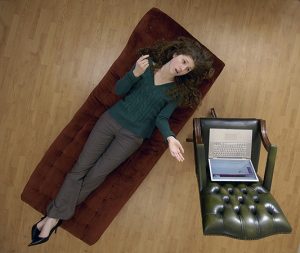(Update May 23) Although as I type this, there are still around 75000 new daily cases of Covid in the UK (according to Zoe), it seems clear that for most people the virus has mutated to a less toxic version and I have now begun working face-to-face again. I’ve left the post below as a record, and just in case it gets bad again.
=============================================================================
Covid-19
The bottom line – we need to work online or by phone for the time being. Distance work is a recognised and effective way of working therapeutically.
I have to adopt a minimum risk approach when booking sessions, of course . At the moment the best advice to protect society as a whole is not to meet in person.
Preparation for Telephone or Online Sessions :
 If you would prefer to work over the phone, let me know ahead of time and then phone me on 07941-989887 at your appointment time. I can phone you back – I have unlimited minutes.
If you would prefer to work over the phone, let me know ahead of time and then phone me on 07941-989887 at your appointment time. I can phone you back – I have unlimited minutes.
 If you would prefer to work using online video sessions, please prepare now! The best and easiest app or program to use is Vsee. It is a sort of very secure Skype, certified secure at the highest level – much more so than the phone, incidentally. If this is your first session, I can understand that you may not want to learn new software on top of whatever else is going on, and that’s fair enough, we’ll do it your way to start with. But when you have decided to continue, please download Vsee (the free version!) to your computer, and test it out, and then tell me what your username is so that I can add you to my contacts list ready for your appointment . Vsee is also available as a phone app. You can download Vsee by simply clicking this invitation (link).
If you would prefer to work using online video sessions, please prepare now! The best and easiest app or program to use is Vsee. It is a sort of very secure Skype, certified secure at the highest level – much more so than the phone, incidentally. If this is your first session, I can understand that you may not want to learn new software on top of whatever else is going on, and that’s fair enough, we’ll do it your way to start with. But when you have decided to continue, please download Vsee (the free version!) to your computer, and test it out, and then tell me what your username is so that I can add you to my contacts list ready for your appointment . Vsee is also available as a phone app. You can download Vsee by simply clicking this invitation (link).
For any kind of distance work, you need to be in a private, quiet space, without people or distractions around, and where you will not be overheard. Sitting in a parked car can work very well when using a laptop or phone.
The Rationale:
1. There seems little doubt that we are all at risk, but the longer we can delay catching it, the more likely the heath services will be able to cope. (Link to article)
2. I see a lot of clients who form an essential part of the infrastructure of society: e.g. NHS staff, ambulance staff, teachers, law enforcement officers. Aside from the fact that this is a group at risk of catching the virus, I do NOT want to catch it and then spread it further! There’s also the matter of confidentiality: if I were to contract the virus I might be required to disclose the identity of clients I had come into contact with in the previous week. No.

3. There is also the matter of my own family – my wife and I are both getting on, and are in a high risk group in terms of the duration and seriousness of an infection. If I become ill, I will recommend a trusted local counsellor for you to speak to if you need to, while I am out of action. Once I have recovered from this virus, it will be back to business as usual.
4. Research indicates that, broadly speaking, online and telephone sessions are very effective in counselling work. A lot of it is personal “fit” – some people find it more effective than face-to-face, and some less. But the research shows that there is a very good chance that it will be effective for you. I have worked online and over the phone since 1995ish.
Thanks for reading.

 Firstly, I was questioned as to whether private therapy was good value compared to the NHS – “The NHS has got to be doing it cheaper, hasn’t it!” was what was said to me. And there certainly wasn’t a question mark at the end of her sentence.
Firstly, I was questioned as to whether private therapy was good value compared to the NHS – “The NHS has got to be doing it cheaper, hasn’t it!” was what was said to me. And there certainly wasn’t a question mark at the end of her sentence.